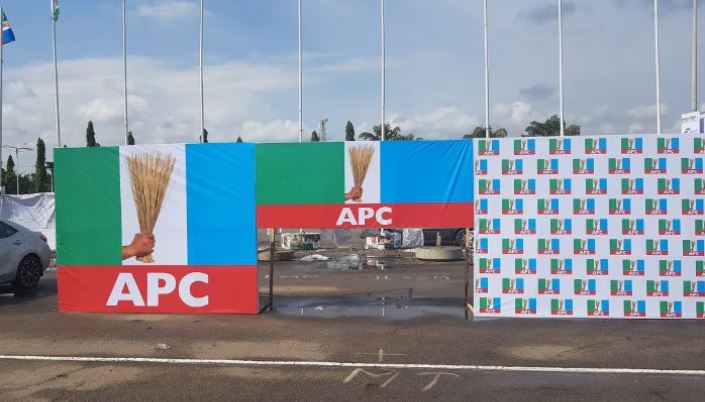The next APC national chairman and politics of the right choice
On Tuesday, the 22nd of January, 2022, President Muhammadu Buhari and governors under the aegis of his party, the All Progressives Congress (APC), rose from a consultative meeting and finally laid to rest speculations about the zoning of the party’s national offices. By a simple play of musical chairs, the APC leaders announced the swapping […]

On Tuesday, the 22nd of January, 2022, President Muhammadu Buhari and governors under the aegis of his party, the All Progressives Congress (APC), rose from a consultative meeting and finally laid to rest speculations about the zoning of the party’s national offices. By a simple play of musical chairs, the APC leaders announced the swapping of roles between the North and South. Thus, offices in the National Working Committee hitherto occupied by northerners in the last eight years will shift to the South and vice versa.
It was a welcome development, especially as it disappointed those who have gone to town in recent times crowing about the imminent disintegration of the governing party for an alleged inability of her leaders to agree on anything. However, it is not yet Uhuru.
- Nigeria loses as Russia-Ukraine war escalates global oil prices
- Police arrest pastor over shooting of teenage girl
This is only possible by a clear-headed SWOT analysis based on the reality on the ground in each geopolitical zone within the context of the overall national balance of power between the APC and her opposition parties, especially the PDP. Now where the party sends the position of national chairman within the North to which it has been zoned is of utmost importance.
To my thinking, the most compelling criteria for the choice of an APC national chairman from Northern Nigeria should be based on the following factors: current strength of the APC in the state from which he or she will emerge, the candidate’s leadership persona, the proven national influence and network of the individual, cognate experience in high political leadership, with a clear line of sight, strong mental and physical fitness for, among other reasons, going through the rigours of leading a campaign across the length and breadth of the country.
Once the above factors are accounted for, and to ensure that no geopolitical zone is marginalized or excluded, the APC must go further to align them with the political considerations that will play out in 2023, many of which are already very visible right now.
For instance, out of the three geopolitical zones in the North, only the North Central has not enjoyed any stint in the seat of power in a democracy since Independence, either as president or vice president and that includes this Fourth Republic. The premise is that parties send their national chairmanship position to the zone they want to exclude, ab initio, from the presidential race.
The people of the North Central have recently risen in uproar against the near default zoning of the national chairmanship of ruling political parties to them once it is the turn of the North, while the other two GPZs savour the two highest positions. There is a groundswell of support for such bodies as the North Central Renaissance Movement (NCRM) which campaigns to withdraw the zone’s support from any party that dumps the chairmanship on them again on the journey to 2023.
Conversely, the region, which hosts the Federal Capital Territory, has promised to rally with their votes round the party that puts one of them on the ballot for the presidency. With the barrage of citizen advocates and groups springing up all over the region around this cause, the APC must not dismiss their threats lightly only to find out they were serious the hard way.
While that may not be the most compelling argument for why the national chairman should come from another zone other than the North Central, it should not be lost on the APC that this is a strong factor that will affect voting patterns in the 2023 presidential race.
Wide-ranging logic and strategy, not sentiments, are therefore the best tools to use in choosing a national chairman for the APC that will be acceptable to all the differing positions.
In the circumstances, logic and strategy would dictate that the APC’s national chairman must come from a state which does not currently have an APC governor. By ceding this very influential position to such a state, the APC will shore up her political weight in that state for forthcoming elections.
The APC is indeed fortunate to have at least two persons who fit the profile perfectly.
Number One is a former governor of Bauchi State, Alhaji Isa Yuguda. My opinion and advice to the APC would be that he is the perfect candidate for a consensus national chairman of the APC from the North.
He has won two gubernatorial elections for himself in Bauchi State; he was a striker in the APC’s lineup for the 2019 presidential election and helped to beat the incumbent governor and the PDP silly in that contest as illustrated in the figures above.
Another excellent pick is Yakubu Dogara, former Speaker of the House of Representatives from 2015 to 2019.
In conclusion, if the APC is to retain the presidency in 2023 and remain a formidable party in Nigeria into the future, the current sentimental approach over legacy party, promise and fail, disregard of health status, North or South zoning, religion, and tribe must stop immediately and make way for clear-headed political assessments such as this one.
By Abubakar Kago, a political scientist, writes from Ahmadu Bello University, Zaria
